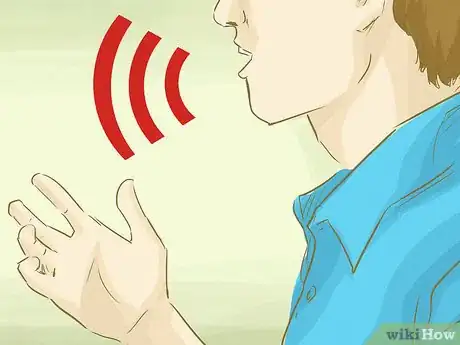This article was co-authored by Joanne Gruber. Joanne Gruber is the owner of The Closet Stylist, a personal style service combining wardrobe editing with organization. She has worked in the fashion and style industries for over 10 years.
There are 12 references cited in this article, which can be found at the bottom of the page.
This article has been viewed 54,474 times.
Masculinity refers to the characteristics, behaviors, and roles associated with men and boys. You could be transgender or nonbinary and attempting to be more masculine, or be a woman and have masculine traits. Anyone, regardless of gender, can be masculine, and this article will teach you how to.
Steps
Being Masculine
-
1Groom yourself everyday. Whatever the reason, it is critical that everyone develops and maintains healthy hygiene habits for the sake of their physical and mental health, relationships, and overall quality of life. Make it a point to groom yourself and look nice on a daily basis. Take a shower every day (or at least every other day), shave (optional), comb your hair, and practice good dental hygiene by flossing or brushing your teeth daily.
-
2Be assertive without being arrogant. People who are assertive are frequently perceived as rude or controlling. The trick is to figure out how to advocate for yourself without making others feel obligated to do the same. You can master this skill with a little knowledge and practice. Knowing how to do this is especially important if you want to assert yourself in situations where you were previously passive.
- Improve your listening abilities.
- Know how to communicate. Being assertive necessitates excellent communication skills.
Advertisement -
3Be courageous. Courage refers to the quality of being ready and willing to face potentially dangerous or painful situations. Make use of positive self-talk. Accept that failure is a possibility. Make bravery a habit. When faced with adversity, the word courageous can be used to describe courageous people or their actions.
-
4Project confidence. Be confident and happy with who you are. Part of being masculine is being confident and encouraging others to be confident. A confident person, overall, happy with the way they are. This isn't to say they can't improve and get better, but they aren't insecure about it and aren't ashamed of themselves. People who are self-assured do not avoid certain situations simply because they are afraid of being judged.
-
5Be considerate and kind. Being considerate entails being courteous and caring. People appreciate it when you consider their feelings. Being considerate of others and their feelings is what consideration entails. You think about how your actions will affect them. You pay close attention to what others like and dislike, and you do things that make them happy.
- Encourage others and give compliments to others.
- Remember the golden rule—treat others how you want to be treated. There's also the platinum rule, treating them how they'd like to be treated, which is also useful at times.
- Volunteering is a great way to be kind and give less fortunate people opportunities.
-
6Avoid being toxic. Toxic masculinity refers to cultural pressures on men to act in certain ways. Toxic masculinity is the idea that some people's definition of "manliness" perpetuates domination, homophobia, and aggression. There is a way to be masculine without being toxic.
- Don’t start (physical) fights or purposely hurt others.
- Avoid intense displays of anger. These can intimidate and frighten other people, especially abuse survivors and some women. When you're mad, keep your voice low, and take a break instead of yelling or lashing out.
- Don’t use your power to dominate others (especially if you’re a man). Instead, use it to be fair and helpful.
- Don't put down women, LGBTQ+ people, or minorities. A healthy masculine person lifts others up instead of bringing them down.
- Appreciate your achievements and possessions without bragging. Don't rub them in other people's faces.
- Don't feel like you have to appear 100% masculine 100% of the time. It's okay to be vulnerable sometimes, drink a "girly" drink, appreciate ballet, or do other things that aren't stereotypically masculine. In fact, this can show that you're secure in your masculinity.
-
7Consider taking up a few masculine hobbies, but don’t let them limit you. A few masculine hobbies include boxing, grilling, or learning something new (an instrument, foreign language). In general, you should do what you enjoy and be proud of it. Don't fall for the myth that you can't have feminine hobbies or not enjoy ‘manly’ hobbies if you want to be masculine. Being happy with what you do and doing what you enjoy is true masculinity.
- If you truly enjoy something, try to immerse yourself in it. When a masculine person discovers something that piques their interest, they tend to learn everything there is to know, practice for hours every day, and money on it. It could be anything. Sports, DIY, arts, cooking.
Acting Masculine
-
1Have good posture. Good posture is one of the most obvious signs of a confident person. People with poor posture are frequently insecure, feeling beaten down, or sad. Take note of how you handle your posture when you're in a bad mood versus when you're in a good mood. When you're feeling good, you probably stand up straighter, head up, shoulders back. When you are confident, your posture will most likely improve, and others will notice.
-
2Take up space. A masculine person is not afraid to take up space. This is particularly true in social settings. When they sit, they will use the armrests and are not afraid to take up the necessary space. Not excessively so, but enough to meet their needs. Sit with your legs uncrossed, keep your hands out of your pockets at all times, and use your hands while speaking.
- Of course, if it's crowded, politely make room for others. For example, if you're on a crowded bus or subway, put your legs together or stand so that people have enough room to sit.
-
3Make eye contact. One of the most important aspects of confident body language is eye contact. People who are self-assured do not avoid eye contact. Looking away quickly indicates that you are afraid of confrontation and are nervous. Keeping eye contact for too long, on the other hand, may give the impression that you're a creep or "intense." It's a difficult balance to achieve. Here are tips to make eye contact properly:
- If you can't look someone in the eyes, choose another part of their face to focus on. Eyebrows and noses are close to the eyes and most people can't tell the difference.
- Mirror your partner’s eye contact. If they look away, you are free to do the same. However, don't do it right away or it will look like you’re copying them.
-
4Speak up when up you need to. Masculine individuals are not afraid to be heard, seen, noticed, and are not afraid to be quiet for any reason. What they do or do not do is not determined by others. It all depends on what they want to do or believe is best. Speak up when something isn't right or when something needs to be said, but don't be rude or intentionally hurtful.
- Speaking up when you or someone else is being hurt or in need of assistance is not feminine; it demonstrates that you are self-assured enough to help others and speak up when necessary.
- If you don't have anything useful to say or lack the knowledge to offer an opinion, simply remain silent and listen. Don't embarrass yourself by spouting uninformed nonsense. When directly asked, you can simply state, "I don't know enough about this to have an opinion.“
-
5Don't let your emotions get the best of you on a regular basis. Masculine people will get stressed from time to time, but they rarely express it in harmful ways. Instead, process your feelings in constructive ways. For example, instead of raising your voice when you get angry, excuse yourself and take a short walk. Feel your feelings while staying rational, polite, and controlled.
- Dealing with your feelings in a masculine matter doesn't mean that you have to bottle it up or never cry. This attitude typically makes them worse, not better, and can lead to mental health problems. Instead, find healthy outlets and try to stay rational when you're making decisions.
- When your emotions get rough, try exercise, meditation, journaling, art, taking a walk, or confiding in someone you trust.
- If you slip up and act out of line, it's not the end of the world. Apologize to anyone you upset, acknowledge your mistake, and try to do better next time. You're only human, so you won't be perfect.
-
6Use confident and attentive body language. Work on using open body language to signal that you're approachable and calm in general. One sign of healthy masculinity is feeling and looking secure in who you are.
- Stand up straight, face the person you're talking to, and listen attentively.
- Cut back on fidgeting unless you really need it. (For example, some neurodivergent people need to stim to self-regulate and stay engaged.)
- Of course, you don't have to fake it if you're having a rough time. It's okay to be vulnerable and let your guard down from time to time, especially around people you trust. Part of being secure in your masculinity is being willing to drop a facade when you need to, trusting that you are still masculine.
-
7Don’t be afraid to say no. Part of being self-assured is knowing how to value yourself. When you value yourself, you don't let others mess with you or tell you what to do. Saying no is a form of self-esteem. Sure, you may have to do things you don't want to do at times, but you must be able to make that decision for yourself.
- Don’t let people mess with you. When/If they do, stand your ground.
Dressing Masculine
-
1Wear clothing that is slightly baggy. Wearing clothes that are slightly larger than your body can assist you in achieving a masculine appearance. Instead of wearing clothing that is too tight and exposes your shape, try on something that is a little looser but still looks good on you. This is especially useful if you have a feminine figure or want to conceal your curves. Often a sports bra or binder can also be used to help with this.
-
2Choose the right accessories. Proper accessories can really elevate an outfit. Masculine accessories include:
- Baseball caps
- Stud earrings
- Watches
- Belts
- Cross body bags
- Beanies
-
3Dress in layers. Layers can be jackets, hoodies, shirts, sweaters, and more. Learn about different types of layers in clothing:
- Hoodies: Hoodies can conceal the shape of your body, curves, and chest, which is why many people prefer them. When paired with structured pieces, they're surprisingly versatile. They are also comfortable and can provide warmth in cold environments and during the winter.
- Flannels: While flannels aren't technically layers, an oversized flannel can be worn with a shirt underneath. These can be worn during autumn and warmer seasons, and come in a variety of plaid patterns.
- Sweatshirts: This is a stylish, casual alternative to baggy hoodies, which can sometimes look sloppy (depending on how baggy they are).
- Crewnecks: Crewnecks can be worn with a lot of different bottoms. Most are designed to fit snugly around your chest, with sleeves that are looser and more relaxed. Keep in mind that crewnecks can put more emphasis on your hips, so if you're trying to pass as a trans guy, remember that.
-
4Wear the right shirts. Shirts make half of an outfit. These are different types of shirts:
- Dress shirts: a dress shirt, also known as a button shirt, is a garment with a collar and a full-length front opening that is fastened with buttons or shirt studs. Dress shirts are longer in length because they are intended to be tucked into pants. Dress shirts are appropriate for formal occasions and dances.
- Oxford button down shirts: This crisp classic is the epitome of versatility. A breezy button-down like this is perfect for everyday denim, but it can also be dressed up with a tailored vest and tie.
- T-shirts: They are comfy, come in a variety of prints and styles, and anyone can wear them. Look for unisex shirts if you have a feminine body but want to achieve a masculine style.
-
5Find the right bottoms. Pants are especially important because they act as a foundation, or anchor, for the rest of your outfit. Pants will be mostly in the background of an outfit, acting as a foundation for your shirt or outerwear in the foreground:
- Baggy pants: A good pair of slightly baggy pants can instantly make you appear more masculine. They are the ideal complement to any masculine wardrobe. Oversized and loose-fitting pants conceal your shape and can be worn by all genders.
- Loose fitting jeans: It's a good idea to invest in classic pieces, such as loose fit jeans, that can be worn with anything, especially t-shirts.
- Chinos/Khakis: Chino and khakis are typically light, cotton-blend pants that come in a variety of colors. These are lighter and more breathable than jeans and denim, which aren't.
- (Knee) shorts: Shorts are short-length trousers or pants that cover the upper part of the leg but do not cover the entire leg. Shorter people can also opt for shorts that hit 2 or 3 inches above the knee to give the illusion of longer legs.
-
6Wear the right shoes. A good pair of shoes not only enhances your fashion appeal, but also assists you in creating the perfect look and satisfying your desire for fashion accessories. Among the various pairs of shoes are:
- Sneakers: Sneakers are shoes that were originally designed for sports or other forms of physical activity, but are now widely used for everyday casual wear.
- Slip on shoes: Slip-ons are typically low-heeled, lace-free shoes worn on casual occasions.
- Converse/vans: These classic, gender-neutral shoes come in a variety of styles.
- Loafers: Loafers are shoes that have no lacing or fastening system and are simply slipped on the foot, and typically go with suits.
-
7Don't wear makeup (optional). If you're trying to look masculine, you might now want avoid makeup, as it can make your face look more feminine. However, if you're trying to pass as a guy, makeup applied in the right way can make you look more masculine.
- You might also want to wear makeup for other reasons, so don't feel limited to makeup.
Community Q&A
-
QuestionWhy would I want to dress masculine if I'm female?
 Luna RoseTop AnswererThat's totally up to you! Some women like a more masculine style of dress or have a "tomboy" personality. Everyone has their own personal style and this article is meant for people who want to make their style a little more masculine. If you want to be more masculine, then you can try some of the tips in this article and see if you like them. If not, that's okay too!
Luna RoseTop AnswererThat's totally up to you! Some women like a more masculine style of dress or have a "tomboy" personality. Everyone has their own personal style and this article is meant for people who want to make their style a little more masculine. If you want to be more masculine, then you can try some of the tips in this article and see if you like them. If not, that's okay too!
Warnings
- Don't let masculinity limit you. You don't have to fit all the stereotypes all the time. Being yourself keeps you balanced and emotionally healthy.⧼thumbs_response⧽
References
- https://nextluxury.com/mens-lifestyle-advice/best-valentines-day-gifts-for-her/
- https://www.panaprium.com/blogs/i/dress-masculine-girl
- https://www.shirtspace.com/blog/what-is-a-unisex-t-shirt
- https://exhibitarchives.com/exhibita/how-to-put-together-gender-neutral-outfits-from-a-non-binary-person
- https://www.dapperq.com/2012/10/ask-dapperq-masculine-shoes-in-my-size/
- https://haanum.com/blogs/news/importance-of-t-shirts
- https://footwearnews.com/2017/shop/shoes/gender-neutral-classic-styles-nike-dr-martens-birkenstock-adidas-468407/
- https://www.trunkclub.com/blog/8-essentials-for-a-gender-neutral-wardrobe
- https://qwear.tumblr.com/post/61321796137/masculine-pants-for-wide-hips
-Step-4-Version-4.webp)







-Step-13-Version-2.webp)
-Step-14.webp)





-Step-12-Version-2.webp)

-Step-8-Version-2.webp)
-Step-9-Version-2.webp)
-Step-10-Version-2.webp)
-Step-4-Version-2.webp)






























































